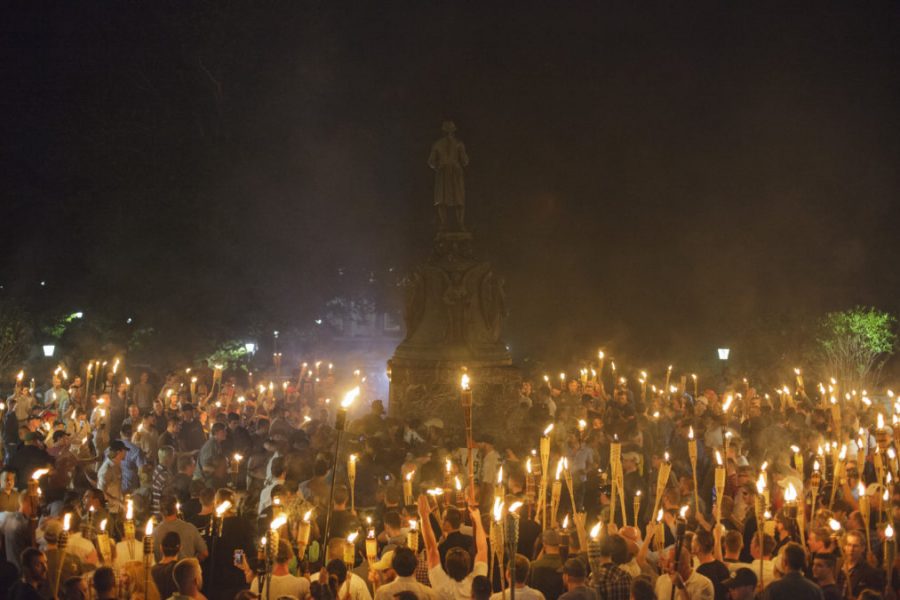The Hate Report: Charlottesville 2.0
Neo Nazis, Alt-Right, and White Supremacists encircle counter protestors at the base of a statue of Thomas Jefferson after marching through the University of Virginia campus with torches in Charlottesville, Va., USA on August 11, 2017 (Photo by Shay Horse/NurPhoto)(Sipa via AP Images)
October 21, 2017
The Hate Report: Charlottesville 2.0
An event originally billed as “Unite the Right 2” after the deadly racist rally in Charlottesville, Virginia, has been planned for a small Tennessee town later this month.
The organizers of the rally, which is now called White Lives Matter, are leaders of lesser-known American racist hate groups, including several present in Charlottesville in August. They include the neo-Nazi National Socialist Movement and white supremacist Vanguard America. James Alex Fields, the man charged with killing activist Heather Heyer in Charlottesville, was photographed holding a Vanguard America shield in the hours before he drove his car into protesters.
Organizers of the Oct. 28 rally say they’re protesting increased immigration in middle Tennessee and bringing attention to a recent deadly shooting at a Tennessee church by a man who emigrated from Sudan. Another stated objective of the rally is to “turn the page on Charlottesville,” according to an event page on the far-right Occidental Dissent blog.
The page also offers advice to participants, including a dress code (the ubiquitous khakis and polo shirts for men, while women are urged to “dress modestly”) and advice about Tennessee’s gun laws. Under a heading “Optics,” it states:
We plan to show that we are a unified movement of diverse organizations who all agree that WHITE LIVES MATTER. In light of this, each organization will participate in these events as a cohesive unit under its own leader, and we will all stand shoulder to shoulder with our own optics, i.e., those with Confederate Battle Flags will be grouped together as will those with American flags.
All of the groups named on the event flier and event page are listed by the Southern Poverty Law Center as hate groups, ranging from neo-Nazis to white nationalists.
The organizers say they have chosen central Tennessee at least partly to avoid violent showdowns with counterprotesters, specifically activists who identify with the anti-fascist, or antifa, movement. Antifa activists have been most vocal in larger cities such as Boston, San Francisco and Berkeley, California. For inspiration, the organizers are looking to an April gathering in Pikeville, Kentucky, which didn’t erupt in violence.
From the event page:
We do not expect Shelbyville to become another Charlottesville. That’s not in our interest. It certainly isn’t in the interest of Shelbyville. We desire to hold a peaceful demonstration.
The Tennessean reports that police in Shelbyville, a town of about 21,000 famous for a breed of horse called the Tennessee Walking Horse, are working on a plan to contain possible violence between the racist groups and counterprotesters. The newspaper quotes police Lt. Brian Crews:
We don’t know how many people we’ll have showing up at this rally at this point in time. We’re making plans that we will have a large gathering and preparing if they do show up.
Crews told the newspaper that he didn’t know the groups participating had been involved in Charlottesville’s Unite the Right rally:
That definitely is a concern, but that’s why we will be making adequate plans to have a sufficient number of law enforcement present for this event.
We’ll be keeping an eye on this event as its organizers ramp up to see whether it garners attention from the far right. We’ll also be watching for reactions from antifa groups to see whether they’re planning to show up to protest the rally.
Reader mailbag: Islamic State vs. white supremacists
Last week, we asked readers to submit questions about hate in America. Doyle Rowland wrote us about parallels between the white supremacists and global radical Islamist movement. He asked:
Could you compare and contrast the underlying root causes of the alt-right’s philosophies and those of radical Islam? I don’t mean the leaders, obviously they are driven by the desire for power. Rather, the rank and file. It seems to me, in my simplistic view of the world, there are many similarities in the basic motivations and mindsets of members of each which makes both highly susceptible to the propaganda of the respective movements.
Two professors at the University of North Carolina at Chapel Hill are studying this very thing. Michael Waltman studies white supremacist radicalization, and Cori Dauber looks at Islamist groups such as the Islamic State.
Both groups, they say, use hate speech as a recruitment tool. Waltman lays out a four-part framework for how white supremacists are radicalized:
Someone sees content that inflames their in-group identity, such as a neo-Nazi website that says thing such as, “White people built Western civilization, and the world should thank you for it.”
They are then exposed to a specific out-group, such as African Americans, who are demeaned to the point that they may not even be recognized as fully human.
That dehumanized out-group is presented as an existential threat to both the in-group and the fate of civilization itself, leading to calls of “you will not replace us.”
In the final stage, the in-group is asked to imagine a world in which the out-group has been conquered, in which only people sharing their identity exist.
Dauber sees basically the same process at work in Islamist radicalization, but with one key difference:
For the Islamic State, one of the biggest out-groups are Shia Muslims. They’re pretty straightforward about their desire to kill all the Shia. But, if a Shia is willing to come over to their side, they’re completely willing to acknowledge a path to repentance. Whereas, to the KKK and the neo-Nazis, someone can’t repent from having the wrong skin color.
Islamic State videos go to great lengths to highlight the movement’s diversity, showing adherents of all colors, Dauber said. They crusade against white supremacy in America, just as American white supremacists use the threat of Islamist terrorism as an argument to close the nation’s borders to nonwhites.
Dauber and Waltman were working together to develop a program to develop counter-extremist messaging that could be deployed on either front of the propaganda war. The effort was slated to receive a Department of Homeland Security grant, but the Trump administration pulled the funding, along with the only other project in the grant program that directly dealt with white supremacists.
The week’s hate-based attacks
Over the last week, we read about at least three notable incidents that appear to have been spurred by hate:
In New York, several Jewish restaurants and bakeries received letters emblazoned with swastikas and bearing President Donald Trump’s campaign slogan, “Make America Great Again.”
Also in New York, police say a black teenager attacked an elderly white man solely because of his skin color. “White people suck. I hate white people. White people are the source of my problems,” 18-year-old Devon Ahmad told police, according to the New York Post.
The Council on American-Islamic Relations wants an attack on a Muslim Lyft driver in Washington state investigated as a hate crime. The council sent the FBI a letter this week, according to Seattle’s CBS station.
Also in Washington state, two men were arrested Monday for an alleged hate crime after a black man was called racist names and beaten up and his home was shot at.
‘I’m mad at God’
A homeless man accused of burglarizing four houses of worship in Queens, New York, earlier year has pleaded guilty to a hate crime. While bias incidents directed at religious institutions are among the most common forms of hate attacks, 24-year-old Joseph Woznik’s targets were unusually diverse – he struck a Roman Catholic church, a Hindu temple, an Episcopal church and a Romanian Orthodox church.
Woznik told authorities after his arrest that he broke into the religious centers because he hated religion.
“I’m mad at God,” he said. “I don’t break into houses, only churches. I break in to get back at God.”
While the targets were diverse, Woznik’s actions fell under New York’s hate crime law because he intentionally selected these communities due to their religious practice, which is the standard for hate crimes prosecution. Each target might have been different, but each attack sprang from the same internal motivation.
Woznik faces up to four and a half years in prison.
Correction: A previous version of this story misidentified a Tennessee church shooter’s national origin. He is originally from Sudan.
Sign up to get The Hate Report by email every Friday.
Have a hate incident to report? Tell us about it here, or contact the Hate Report team: Aaron Sankin can be reached at [email protected], and Will Carless can be reached at [email protected]. Follow them on Twitter: @asankin and @willcarless.
![]()
This story was originally published by Reveal from The Center for Investigative Reporting, a nonprofit news organization based in the San Francisco Bay Area. Learn more at revealnews.org and subscribe to the Reveal podcast, produced with PRX, at revealnews.org/podcast.




















